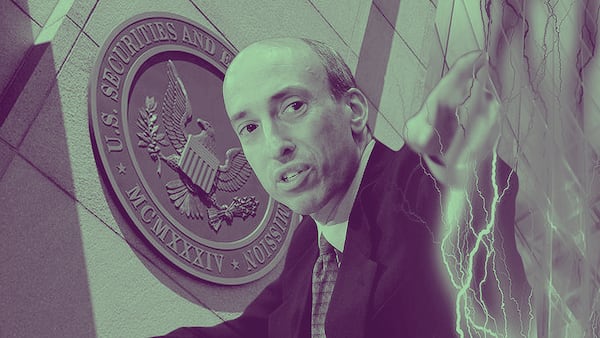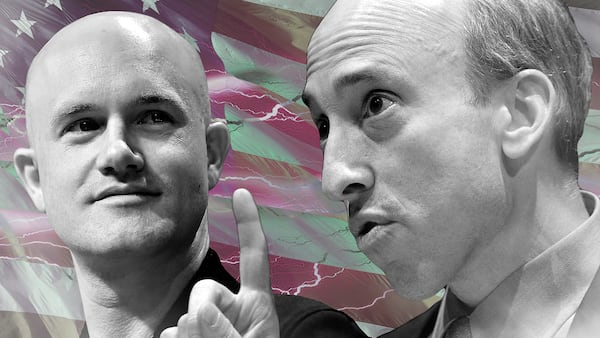- Uniswap said this week it’s expecting enforcement action from the SEC.
- The firm slammed the regulator in a blog post.
- A former SEC official says that’s a big mistake.
Lawyers often have a key piece of advice for corporate clients: Don’t poke the bear.
It’s unusual for business leaders to rail against regulators when they are slapped with enforcement notices or lawsuits.
Coinbase CEO Brian Armstrong has flipped that script ever since the US Securities and Exchange Commission warned his exchange it would sue for alleged violations of securities laws.
Instead of avoiding the appearance of trying to influence a judge or jeopardise his relationship with the SEC, Armstrong has been outspoken about what he believes is unfair treatment.
Uniswap Labs — one of the biggest names in decentralised finance — appears to be taking a leaf out of Armstrong’s pugilistic playbook.
Uniswap said this week that it has received a formal notification, known as a Wells Notice, that the SEC is planning to sue.
The firm had fighting words for the markets watchdog.
“Taking into account the SEC’s ongoing lawsuits against Coinbase and others as well as their complete unwillingness to provide clarity or a path to registration to those operating lawfully within the US, we can only conclude that this is the latest political effort to target even the best actors building technology on blockchains,” Uniswap said on its blog.
Those words may come back to bite Uniswap, John Reed Stark, a former head of the SECs Office of Internet Enforcement, said.
“I am always amazed when SEC Wells Notice recipients fight back by throwing stones at the SEC with obnoxious/insulting PR campaigns, like the one Uniswap seems to have begun,” Stark, who worked for the SEC for almost 20 years and who is now a consultant, wrote in a post on X.
“Such futile attempts to rally the mob pretty much always backfire.”
SEC Sends Wells Notice to Uniswap. Not Surprising.
— John Reed Stark (@JohnReedStark) April 10, 2024
However, I am always amazed when SEC Wells Notice recipients fight back by throwing stones at the SEC with obnoxious/insulting PR campaigns, like the one Uniswap seems to have begun. Such futile attempts to rally the mob pretty… pic.twitter.com/3oUti4LQ9m
Financial regulation expert Sean Tuffy said it isn’t surprising to see Uniswap follow Armstrong’s example.
“The crypto world has decided the best defence is a good offence,” he told DL News.
“The SEC has had some pretty public losses recently, and I think the industry smells blood in the water, which has further emboldened firms to publicly challenge the SEC,” Tuffy said.
He added that it’s also a strategy targeted at swaying public opinion beyond the crypto community and to “galvanise support from lawmakers who are increasingly critical of the SEC’s approach to crypto regulation.”
‘The SEC has had some pretty public losses recently, and I think the industry smells blood in the water, which has further emboldened firms to publicly challenge the SEC.’
Coming for DeFi
The SEC under chair Gary Gensler has brought a slew of lawsuits against crypto’s biggest players.
Till now, the most high-profile of these were against centralised exchanges Binance, Coinbase, and Kraken.
As DL News reported, a lawsuit against Uniswap would mark a significant escalation in the SEC’s war against crypto, signaling that the agency is casting its enforcement net wider to catch DeFi.
Uniswap Labs is the main developer of one of the world’s largest decentralised exchanges, with more than $1.6 billion in user deposits, according to data from DefiLlama.
Coinbase to Uniswap’s defence
Armstrong, the Coinbase CEO, has often rung the refrain that the SEC is overstepping its authority and holding back an industry whose innovation could benefit Americans.
The industry echoes these sentiments when new enforcement cases are announced.
Coinbase director Kathryn Haun wrote in a post on X on Wednesday that Uniswap is “among the most thoughtful builders in this space,” including in its approach to legal and regulatory issues.
“Gensler [and the] SEC’s message here is clear: No matter how thoughtful and transparent you may be in your approach to securities law and regulations — which is itself unclear in [crypto] — we don’t care,” she wrote.
“The SEC may not care how thoughtful founding teams building here in the US like this have been, but I suspect a court and/or jury will see this for what it is — regulation by enforcement that is an end-run around an open legislative or rulemaking process.”
Hayden and @Uniswap are among the most thoughtful builders in this space, not just in how they approach product and community, but in how they have approached legal and regulatory issues related to securities laws head-on and in good faith. Gensler & SEC’s message here is clear:… https://t.co/9F1LF0SrgG
— Kathryn Haun (@katie_haun) April 11, 2024
Stark called these kinds of arguments “a weak, risky, and losing strategy,” adding that Uniswap was trotting out a “tired, anaemic, old, and failed monologue.”
“Expect the SEC Enforcement staff to lean in and file a voluminous and robust federal complaint” that convinces a court on every litigated issue, he added.
Mixed record
The SEC has had a mixed track record so far in its litigation on whether crypto businesses are violating securities rules.
In the court battle between Ripple Labs and the regulator, a judge handed down a decision that was so split it was celebrated as a win by both sides.
That precedent was later disregarded by a different judge in the Terraform Labs case, which the SEC won.
And in March, US District Judge Katherine Polk Failla of New York ruled that the SEC’s suit against Coinbase could proceed to trial.
While that just means Failla thinks the case is worth hearing, and doesn’t necessarily indicate that the SEC will win, she had some discouraging words for crypto proponents.
In her decision, Faila intimated that crypto assets don’t appear to be novel instruments.
“The ‘crypto’ nomenclature may be of recent vintage, but the challenged transactions fall comfortably within the framework that courts have used to identify securities for nearly 80 years,” she wrote.
Uniswap and Coinbase didn’t immediately respond to requests for comment.
Got a tip? Reach out to the author at joanna@dlnews.com.







